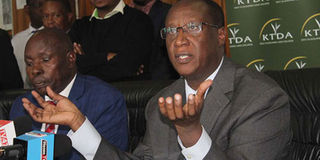Murang’a battle with KTDA offers hope

Kenya Tea Development Agency Chief Executive Officer Lerionka Tiampati addresses the press in Nairobi on October 3, 2019 concerning farmers' bonuses. Kenya has 20 other private companies that operate outside KTDA management. PHOTO | LUCY WANJIRU | NATION MEDIA GROUP
What you need to know:
- A day after the contract lapsed, a contingent of armed police arrived at Kiru factory and replaced the management’s security with “agents of KTDA Holdings”.
- In Clause 10.3 of Sessional Paper No 2 of 1999, tea factories were allowed to independently appoint their own management agencies.
On December 6, 2017, the High Court ordered the Kenya Tea Development Agency (KTDA) to halt elections for new directors of Kiru Tea Factory Limited in Murang’a County.
KTDA officials not only defied the order but went ahead — in a show of might in which the local police were involved.
On February 22, 2019, Court of Appeal Judges W. Ouko, Fatuma Sichale and J. Otieno-Ondek found KTDA chief executive Lerionka Tiampati, company secretary Dr Ken Omanga and directors Stephen Maina Githiga, Eston Gakunju, Peter Kinyua, and Francis Macharia guilty.
On April 4, they were sentenced to seven months’ imprisonment or pay a fine of Sh400,000 each.
The struggle by Kiru Tea Factory under the chairmanship of Chege Kirundi, once a KTDA insider, is now testing the future of the agency as the management agent of smallholder factories.
But KTDA has been fighting back knowing well that if other factories follow suit, the cheese will be gone, forever.
ELECTIONS
The bone of contention was Kiru factory’s desire not to renew the 10-year contract with KTDA, which was to lapse on June 30, 2019, and demanded a forensic audit on the management of the factory.
To begin the delinking process, the Kiru board removed the KTDA-appointed company secretary, Dr Ken Omanga, and replaced him on September 11, 2017 with Bernard Kiragu. The board had argued that Dr Omanga “was conflicted” because he was also the company secretary for KTDA Holdings and KTDA Management Service.
In 2017, KTDA decided to call for nominations of a new board of directors for the factory.
In order to stop the agency, the board moved to Nyeri High Court seeking to restrain KTDA from interfering with the organisation of Kiru Tea Factory Limited.
While Justice T. Matheka had dismissed the matter as sub judice, since there was another case pending in Milimani, the Court of Appeal directed that “no elections will be held until the ruling is delivered”.
But on November 21, 2017, Dr Omanga called for a board meeting which installed Mr Stephen Githiga as the chairman.
FACTORY SEIZED
He also convened an Annual General Meeting on December 14, 2017 despite the court order and brought on board two directors, Michael Kamotho and John Waweru. It was this meeting that passed a resolution to extend KTDA’s management contract.
The Court of Appeal ruled that “whoever convened, presided over and attended the AGM violated the status quo order of this court” — and as such the resolution of that meeting remains ineffective.
What followed the lapse of the initial management contract is a circus which has been played out silently.
A day after the contract lapsed, a contingent of armed police arrived at Kiru factory and replaced the management’s security with “agents of KTDA Holdings”, according to the compliant letter sent to Agriculture Cabinet Secretary Mr Mwangi Kiunjuri.
“Put simply, on July 1, 2019, the Government of Kenya, through police officers, seized control of Kiru Tea factory and is effectively in full control of the company … in defiance of the constitution,” the letter to Mr Kiunjuri and signed by Mr Kirundi states.
By refusing to sign the contract with KTDA, the regulator Tea Directorate has been insisting that Kiru tea farmers should only sell their produce through East African Tea Trade Association, which runs the Mombasa tea auction.
AUCTION
But in the letter received on August 19, 2019 at the desk of Agriculture Cabinet Secretary, Mr Kiunjuri, the Kiru factory directors have accused EATTA of “refusal to renew this company’s membership on account of the terminated contract with KTDA-Holdings Limited”.
“Noting that there is no law barring this company from auctioning its tea,” the factory asks the minister to “issue this company with a licence to auction its tea outside the discriminative and docile yoke of EATTA with its players as used by KTDA-HL monopoly”.
Mr Kiunjuri has also been told that being a limited liability company, the shareholders of Kiru factory are the 8,000 small-scale farmers of Mathioya Sub-County and KTDA Holding has no proprietary interest.
Why the government wants to force the farmers to continue trading under the umbrella of KTDA is not clear.
Already, Kenya has 20 other private companies that operate outside KTDA management.
“The fallacy and false narration that only KTDA-HL can manage this company is dispelled by the fact that its relationship with this company was purely contractual and that contract has come to an end,” said the letter to the CS.
In Clause 10.3 of Sessional Paper No 2 of 1999, tea factories were allowed to independently appoint their own management agencies.
“The sessional paper did not outlaw situations where tea factories govern themselves and determine their own management,” says a report handed over to the CS.




